Evaluating Country Programmes - OECD Online Bookshop
Evaluating Country Programmes - OECD Online Bookshop
Evaluating Country Programmes - OECD Online Bookshop
You also want an ePaper? Increase the reach of your titles
YUMPU automatically turns print PDFs into web optimized ePapers that Google loves.
<strong>Evaluating</strong> <strong>Country</strong> <strong>Programmes</strong><br />
244<br />
money, raising children, which make life challenging and frustrating. Even modern<br />
conveniences become a source of frustration. For example, electricity quickly<br />
becomes “essential”, and once this happens, power failures become a source of<br />
distress, and not an occasion for contemplation as to how beneficial it is.<br />
Second, increased access to the outside world tends to weaken the commitment<br />
of people to the community as a social network and repository of values.<br />
Young people acquire foreign ideas from television and movies that make them<br />
less willing to accept the traditional norms and customs of their own community.<br />
Schoolteachers are no longer community leaders or progressive elements. Before<br />
there was a road, they had no choice but to live in the village; now they live in Turrialba<br />
and arrive only for school hours.<br />
Third, people are worried about the future. They worry about politicians in the<br />
capital city, about powerful economic interests that might hurt the small producer<br />
or employee, about deterioration in the quality of education for their children. In<br />
sum, they worry about the same things most Americans worry about.<br />
Has USAID made a difference in Aquiares and San Juan Sur?<br />
When it comes to ultimate beneficiaries of development assistance, such as the<br />
residents of Aquiares and San Juan Sur, the causal role of USAID cannot be separated<br />
from other factors. Nevertheless, Agency activities left discernible footprints. In coffee,<br />
the quadrupling of yields surely owes a significant amount to USAID-promoted initiatives.<br />
First, US agronomists introduced scientific approaches to coffee production by<br />
identifying nutrients lacking in the soil. This knowledge apparently led to significant<br />
and rapid increases in yields. Second, USAID and other US government assistance to<br />
coffee research helped develop and disseminate new coffee varieties that produced<br />
higher yields and required less care. These improvements were probably introduced<br />
into the communities through a variety of channels, such as extension agents, 4-S clubs<br />
(the local equivalent of 4-H clubs), fertiliser salesmen, and word of mouth from farmer<br />
to farmer. San Juan Sur has long had a 4-S club, the product of an early organisational<br />
effort by US agricultural advisers who organised 158 clubs in the 1950s.<br />
Collaborative efforts by USAID and the Costa Rican Government in rural<br />
roads, public health, education, and water and sewerage, also touched the communities,<br />
at least indirectly. In all these areas, important advances occurred in<br />
directions that USAID was working collaboratively to promote. In recent years, the<br />
restoration of macro-economic stability to the country has provided a more<br />
favourable environment for people in the villages. A seriously overvalued<br />
exchange rate prior to US – assisted stabilisation in 1982 – 84 heavily penalised<br />
coffee producers and was probably a factor in the bankruptcy of the Aquiares<br />
hacienda during that period. Coffee producers received substantially less for<br />
their product than they would have if the exchange rate had been adjusted for<br />
<strong>OECD</strong> 1999



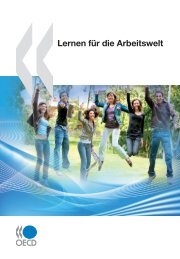

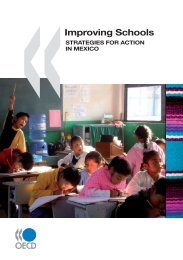
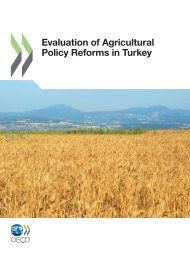
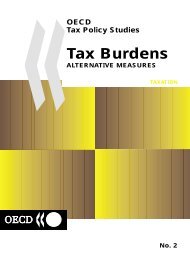
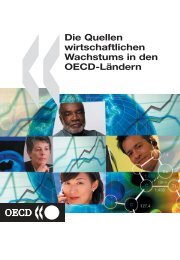
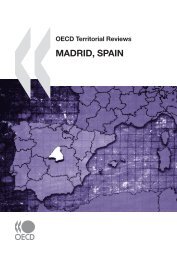


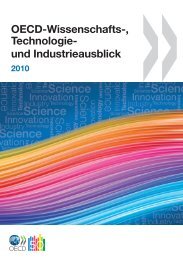
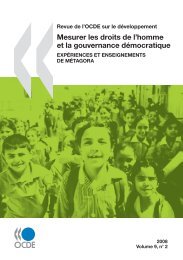
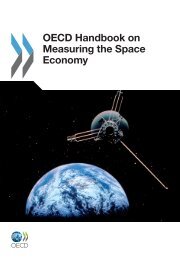
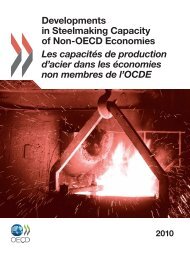
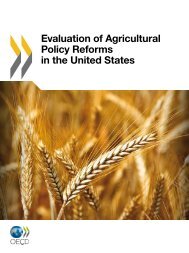
![CQE=U]^\]Z: KAZAKHSTAN - OECD Online Bookshop](https://img.yumpu.com/3915768/1/190x253/cqeuz-kazakhstan-oecd-online-bookshop.jpg?quality=85)